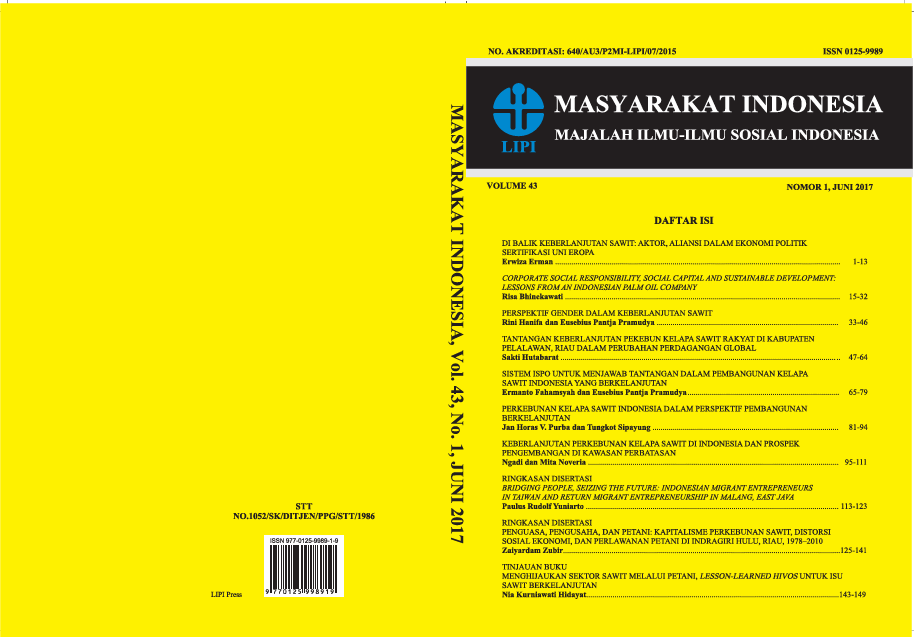MENGHIJAUKAN SEKTOR SAWIT MELALUI PETANI, LESSON-LEARNED HIVOS UNTUK ISU SAWIT BERKELANJUTAN
DOI:
https://doi.org/10.14203/jmi.v43i1.752Abstract
.
References
Brandi, C., Cabani T., Hosang, C., Schirmbeck, S., Westermann, L., & Wiese, H. (2013). Sustainability certification in the Indonesian palm oil sector, Benefits and challenges for smallholders. Bonn: Deutsches Institut für Entwicklungspolitik (DIE). Diakses 16 Februari 2015 dari http://www.die-gdi.de/uploads/media/Studies_74.pdf.
Colchester, M., & Jiwan, N. (2006). Ghost on our own land Indonesian oil palm smallholders and the roundtable on sustainable palm oil. England: Forest Peoples Programme. Diakses 28 Agustus 2014 dari http://www.forestpeoples.org/sites/fpp/files/publication/2011/02/ghostsonourownlandtxt06eng.pdf.
Directorate General of Estate Crops. (2016). Tree crop estate statistics of Indonesia, palm oil 2014–2016. Jakarta: Directorate General of Estate Crops.
Hidayat, N. K., Offermans, A., & Glasbergen, P. (2016). On the profitability of sustainability certification: An analysis among Indonesian palm oil smallholders. Journal of Economics and Sustainable Development, 7(18), 45–62.
Hidayat, N. K. (2017). At the bottom of the value chain: Sustainability certification and the livelihoods of palm oil smallholders in Indonesia. Maastricht: datawyse Universitaire Pers.
Hidayat, N. K., Glasbergen, P., & Offermans, A. (2015). Sustainability certification and palm oil smallholders’ livelihood: A comparison between scheme smallholders and independent smallholders in Indonesia. International Food and Agribusiness Management Review, 18(3).
Hidayat, N. K., Offermans, A., & Glasbergen, P. (2017). Sustainable palm oil as a public responsibility? On the governance capacity of Indonesian standard for sustainable palm oil (ISPO). Agricultural and Human Values. doi: 10.1007/s10460-017-9816-6.
Koh, L. P., & Wilcove, D. S. (2008). Is oil palm agriculture really destroying tropical biodiversity? Conservation Letters, 1(2), 60–64. doi: 10.1111/j.1755-263X.2008.00011.x.
Molenaar, J. W., Persch-Orth, M., Lord, S., & Harms, C. T. J. (2013). Diagnostic Study on Indonesian Oil Palm Smallholders: Developing a better understanding of their performance and poten tial. Jakarta: International Finance Corporation (IFC).
Obidzinski, K., Andriani, R., Komarudin, K., & Andrianto, A. (2012). Environmental and social impacts of oil palm plantations and their implications for biofuel production in Indonesia. Ecology and Society, 17(1). doi: 10.5751/es-04775-170125.
PASPI. (2016). Mitos dan fakta industri minyak sawit Indonesia dalam isu social, ekonomi dan lingkungan global. Bogor: Palm Oil Agribusiness Strategic Policy Institute (PASPI).
Pramudya, E. P., Prawoto, A., & Hanifa, R. (2015). Menghijaukan Sektor Sawit Melalui Petani Lesson-Learned Hivos untuk Isu Sawit Berkelanjutan. Jakarta: Renebook.
Rifin, A. (2013). Analysis of Indonesia’s market position in palm oil market in China and India. Journal of Food Products Marketing, 19(4), 299–310. doi: 10.1080/10454446.2013.726950.
Rist, L., Feintrenie, L., & Levang, P. (2010). The livelihood impacts of oil palm: smallholders in Indonesia. Biodiversity and Conservation, 19(4), 1009–1024. doi: 10.1007/s10531-0109815-z.
Rival, A., & Levang, P. (2014). Palms of controversies oil palm and development challenges. Bogor: Center for International Forestry Research (CIFOR).
Sheil, D., Casson, A., Meijaard, E., van Noordwijk, M., Gaskell, J., Sunderland-Groves, J., Wertz, K., & Kanninen, M. (2009). The impacts and opportunities of oil palm in Southeast Asia: What do we know and what do we need to know? Occasional paper CIFOR no. 51. Bogor: Center for International Forestry Research (CIFOR).
Suharto, R. (2010). Why Indonesia needs ISPO. The Jakarta Post, 20 October 2010. Diakses 15 Juni 2015 dari http://www.thejakartapost.com/news/2010/12/02/why-indonesia-needs-ispo.html.
Suharto, R., Husein, K., Sartono, Kusumadewi, D., Darussamin, A., Nedyasari, D., … Prasojo, R. (2015). Studi bersama persamaan dan perbedaan sistem sertifikasi ISPO dan RSPO. Jakarta: Kementerian Pertanian Republik Indonesia dan
Roundtable on Sustainable Palm Oil (RSPO).High Conservation Value. (2015). Diakses dari http://hcv-ni.org/definisi-high-conservation-value/.
Downloads
Published
How to Cite
Issue
Section
License
Copyright (c) 2018 Author(s)

This work is licensed under a Creative Commons Attribution-ShareAlike 4.0 International License.


